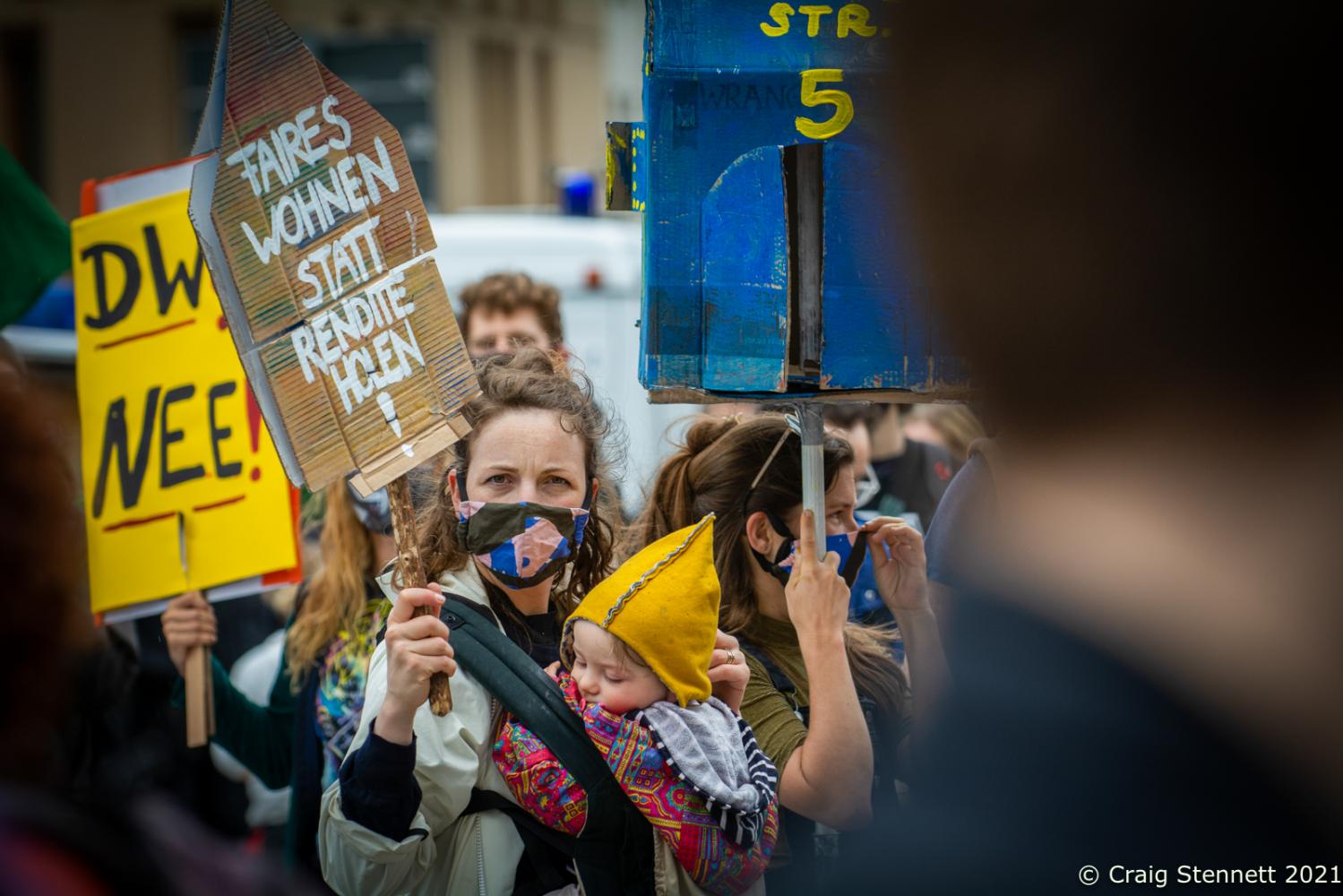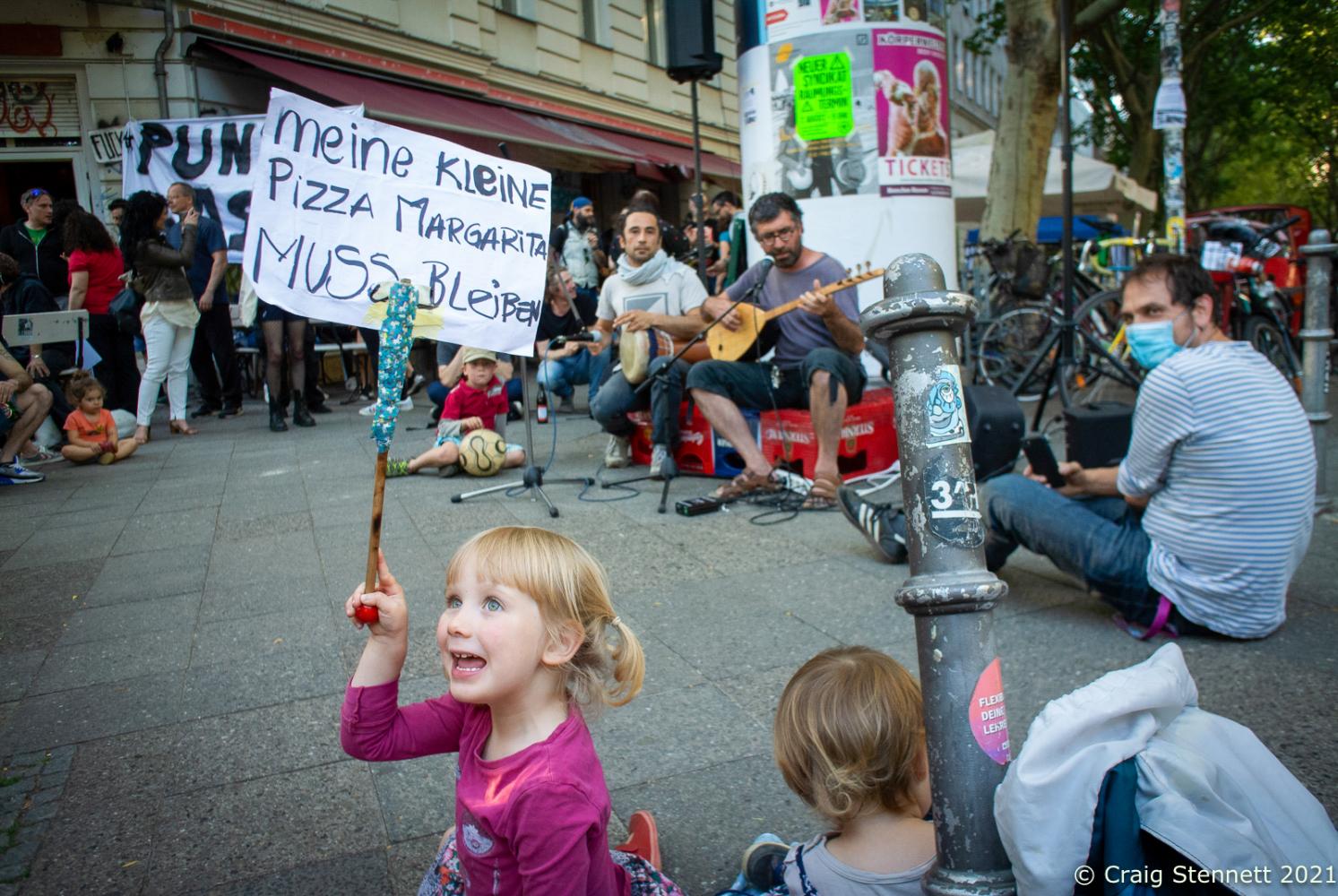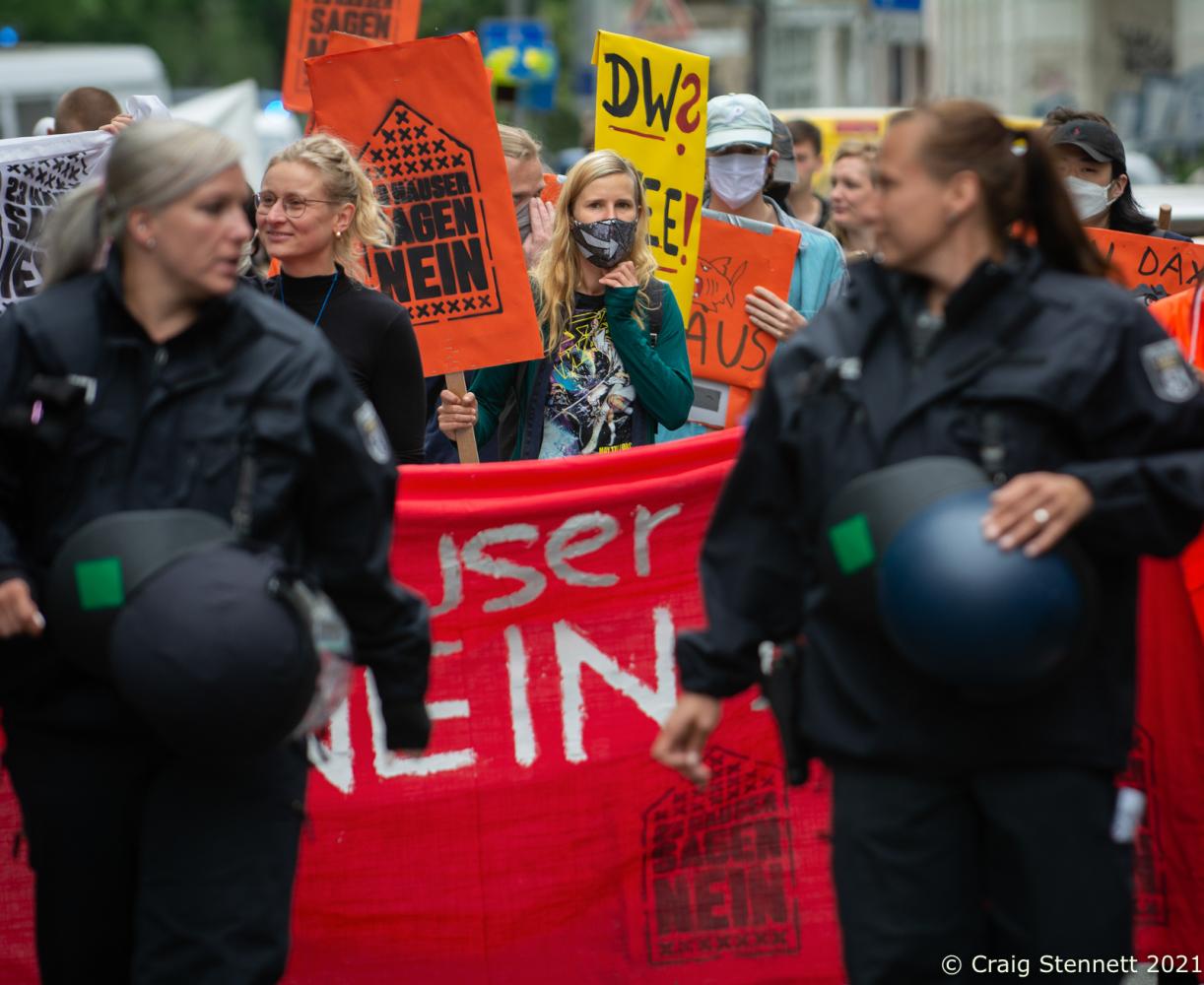Public Story
The Gentrification of Berlin.
The Gentrification of Berlin
It's time to join the Resistance
"It's a Revolutionary Supplier which we helped relocate 3 years ago when they were having problems with their landlord." Pausing, and with an input of humour he adds dryly : "It's got everything inside you need to start a revolution." 46-year-old teacher Markus Kammermei of the local Kreuzberg voluntary housing support group "Bizim Kiez" – a Turkish-German language mix meaning "Our Neighbourhood" –is taking a walking tour of the district he has lived in for the last 14 years. Outlining his support group's mission, he offers this summary: "Our main goal at Bizim Kiez is to foster solidarity, self-empowerment and allow people to resist."
Welcome to Kreuzberg! Part of the Friedrichshain-Kreuzberg Borough of Berlin, to be precise. Enclosed on three sides by the Berlin Wall during the Cold war years when Berlin was literally a divided city. Home in recent history to the Squatters and Autonomist movements and an alternative Art and Punk Scene. Overlapping groups that have infused Kreuzberg with character, history, life, and politics. It's still a largely mixed heritage working-class district with a strong Turkish migrant "Guest Workers" community, breathing a very special flavour of life into its makeup. Now though, it seems that this is all under threat. Irreversible change is on its way, but not, as the locals say, "without a fight".
In Berlin, today, an estimated 85% of the city's residents are renting. In the last decade alone, the average rent for new properties with new tenancy agreements have increased by 100%. Indeed, the intensity of rent rises has gathered its own pace, as 2017 alone saw a rising figure of over 20%. Compared to other global cities such as London, Hong Kong or San Francisco, Berlin may still appear cheap, but that situation will, if unchecked, be only temporary. At the beginning of this year, in an attempt to respond to the problem, The Federal State of Berlin introduced the "Rent Cap Act" as a formula to hold down the spiralling cost of living in the city. In theory, it puts a 5-year moratorium on further rent increases pegged to 2019 levels. There are, however, caveats to this, which can circumvent the cities covenant, such as a landlord making improvements to the property would add rental value. Before that, the city had already activated the "Mietpreisbremse", allowing tenants who moved after 2015 to apply for a fair rent assessment on their accommodation. Berlin's longer-term aspiration is to bring all previously sold apartments back under the municipalities tenant friendly protective umbrella – cash permitting.
The back story to Berlin's predicament can be found in decisions made in the 1990's. The "poor but sexy" cash strapped city, following German Unification, sold off some two thirds of its publicly owned housing stock in a bid to cover the cities ballooning debts coupled with a political incentive of the time to rapidly introduce Shock Capitalism to the former Socialist East enforced mainly by the so called "Treuhand". A mini property bubble briefly occurred in Berlin, fuelled by the professional real estate, urban renewal companies and venture capitalists, as apartments and businesses were snapped up for pennies on the pound. However, it never fully panned out due to Berlin's inherent lack of industry and commerce.
The city had been hollowed out of revenue generating businesses after 1945, when big and small enterprises alike fled the Soviet encircled city. They did not return immediately upon the fall of the Berlin Wall, blunting any continued run-away property bubble by the sheer lack of cash in Berliner’s pockets. Roll forward to 2008 and the World Wide Financial crash, property started to look like a safer bet for higher return for speculators than stocks and shares. Capital was factoring into the already present international cliental lifestyle of this famed "affordable" city. The development of expensive up-market bars, restaurants and hotels were also part of the mix, catering to the influx of travellers with money in their pockets and the already wealthy newly embedded residents. A once divided city is seemingly set to split again along the lines of wealth with the self-perpetuating forces of gentrification and winner takes all capitalismcoming in to place. The good people of Kreuzberg have already started to feel the heat.
52-year-old Ricarda, ex seamstress and now semi-retired due to ill health, has been living in Berlin since 1987: "Over my time here some houses have got nicer. There's never a standstill in Berlin. Until 2008 this was a kind of natural gentrification. It was ok and you could understand it. It really accelerated after 2008. So many small shops have been forced to close. Things you need for your daily life. It's only been replaced with restaurants and bars and tourists. The Berlin that we know is going to be lost forever, unless we get a lot of people onto the streets to stop this."
In a bid to save her own apartment Ricarda has been active in the tenant’s alliance "Willi wollt's anders" at Wrangelstrasse in Kreuzberg. Her residence is situated in the Luisenstadt social preservation area, an initiative which is supposed to ensure that the makeup and character of the area should remain intact. Lisa John, a fellow resident of Wrangelstrasse outlines the present situation: "Our house has now been sold to a private investor. We achieved some guarantees with our protests from the new landlord but you learn everything by chance. We only came to know our house was up for sale in the first place because one of us stumbled across it being advertised on the internet. It's very frustrating that there is no transparency. As a tenant you are the most concerned party, because it's your home, but you seem to be the last to find out what's happening." The house was purchased by Henrik Ulven, of Heimdal Zweite Immobilien GmbH based in Berlin. "What we were hoping for was a Berlin owned housing association to take our property", says Lisa, "What’s so worrying about this whole process of gentrification is that it's invisible. There could be 10 more houses in our street being sold right now and no one would know, unless the tenants stand up and make a noise."
On Falckensteinstrasse opposite "No Name Park" in Kreuzberg, local residents Lorena Jonas and Anna Lafrenz of "23 Houses say No" are in discussion about their recent campaign to protect their apartments. After a 3-month period of action by the group all 23 houses have just been bought by Deutsche Wohnen, one of the big players in the German property market. Their campaign did achieve some guarantees on continuity of rent and living conditions from the new buyers. Lorena Jonas explains: "All of the Kreuzberg houses that were sold are in the protection area Luisenstadt, which is supposed to prevent gentrification. But a new landlord just needs to modernize a property and then the rent can be put up, forcing a lot of the poorer tenants out. At our first meeting, when all the houses came together, we knew we had to go out on to the street and make as much noise as possible. I contacted all the political parties in Berlin for help, except the AfD. I believe our actions secured some concessions."
The group organized a performance piece of street theatre called "Wohnopoly" – an adapted and huge outside version of the board game Monopoly – in front of the Parliamentary Rotes Rathaus (Berlin Town Hall). Local residents played various characters mimicking the "property game" of trying to find and secure somewhere to live against the forces of big business and corrupt politicians. Anna Lafrenz: "I played one of the property developers who gets chained up in the end of the performance." Smiling, she continues: "You know you have to mobilize your own community for action as no one else will. We had a meeting with "Bizim Kiez’" who were great with advice and support. We also knocked on doors and put up notices and started an email group to keep everyone informed." In response to Deutsche Wohnen securing the apartments: "It’s not the worse that could have happened with the guarantees they've given, but we're still pissed off about it." Lorena comes in again highlighting an intrinsic problem facing her neighbourhood: "As tenants we have some protection, but the businesses here have none. The critical infrastructure of shops and stores that are essential to our life here have no protection. Once their contracts are up, any new rent can be set. If they can't pay – they go."
It's a warm and pleasant evening on Oranienstrasse in Berlin. The street, which once drew international attention as the setting for the May Day (International Workers Day) pitched battles between the Squatters Movement, Autonomists and the Police in the late 80's – an annual tradition the neighbourhood has kept alive to this day –, is now experiencing a gentler form of protest this evening. Supporters are gathering in defence of the bookshop Kisch & Co. Poetry, book readings, music and politics are the activities on the street outside the shop. Kisch & Co, a literary fixture on Oranienstrasse for over 23 years, has been without a contract with its new landlord since the end of May. Thorsten Willenbrock, joint owner of the bookshop, explains: "Our block was sold at the beginning of this year for 35.5 billion Euro to a real estate fund in Luxembourg and we offered the new owners a rent but they refused. Our only weapon now is publicity to bring attention to the situation." The bookstore has already experienced a 15% drop in income prior to the Corona pandemic due to the nature of the neighbourhood changing. The "touristification" of Oranienstrasse has left its mark with the proliferation of bars and restaurants catering to the "drinking visitor" and supplanting the shops for regular customers from the neighbourhood. "It's a contradiction that people come to Kreuzberg for its spirit, but their presence is destroying it", says Willenbrock, "Eventually we'll become like London, where nothing is left of the character that was there before."
51-year-old Philipp Vergin, a personal assistant to a Berlin MP and active within the local community through "Bizim Kiez", is in the crowd: "In a city you can be anonymous but this is a problem for solidarity and action. When I first moved to Wrangelkiez in Kreuzberg it had a really large Turkish community and people on lower incomes or unemployed. Their houses have been sold and sold again, and each time their rents go up. Small shops, groceries, banks, and drug stores have disappeared to be replaced by bars. You have to see the small successes and victories to keep you motivated and keep the struggle going. There are global players with money buying up Berlin, but we want that everyone who wants to stay in Kreuzberg, business or tenant, can stay here. That's our aim."
A crowd of several hundred have gathered to offer support to the bookshop and have occupied the now closed off street enjoying the upbeat ambience of the protest. The cross-support network of action is evident as Ricarda from the Wrangelstrasse group is there and addresses the crowd. When asked if all this resistance being played out by Kreuzberg residents at various levels will truly make a difference, she answers with the historic quote "Who fights can lose, who doesn't has already lost." The residents of Kreuzberg intend to fight.
© Craig Stennett








































